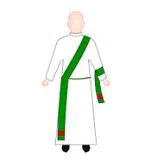The Greek word diákonos , which translates as “servant,” came into late Latin as diacŏnus . The notion arrived in our language as deacon , a concept that is used in the field of religion .
 A deacon is called an ecclesiastic who, according to the Christian branch, can fulfill different functions . Generally the deacon is in charge of providing assistance to the priest during the celebration of mass.
A deacon is called an ecclesiastic who, according to the Christian branch, can fulfill different functions . Generally the deacon is in charge of providing assistance to the priest during the celebration of mass.
It is, in this framework, a lower degree than that obtained by the religious who receives the sacrament of Holy Orders . Saint Francis of Assisi , Saint Lawrence and Saint Stephen are some historical figures of Christianity who were deacons.
The Second Vatican Council dedicated itself to defining the position of deacons in the structure of the Catholic Church, pointing out that they are responsible for receiving the laying on of hands in order to the ministry, not the priesthood. A deacon serves the faithful in charity, word, and liturgy .
There are many people who confuse what a deacon is with a priest. For this reason, it is necessary to discover their main differences, among which we can highlight the following:
-While the priest does have the so-called sacramental powers, the deacon does not.
-The priest can officiate the vast majority of the sacraments and the deacon cannot. However, the latter may be allowed to conduct a funeral. In a mass he will be in charge of, for example, reading the Gospel.
-The priest uses different types and colors of clothing based on the ceremony he is going to officiate or his degree. However, the deacon always wears a dalmatic and a cross stole.
In addition to everything stated above, we cannot ignore another series of aspects related to the deacon, among which are the following:
-Their service is to the word of God and the Eucharistic as well as in favor of charity, peace and justice.
-As a general rule, the training that a man must carry out to become a deacon is made up of three phases or stages: the aspirantate, which is nine months long; the candidacy, which lasts four years and is a very intense training period; continuous diaconal formation, which refers to what is the entire active period of that one. A formation where both the spiritual, the pastoral and the human will be fundamental.
It is possible to differentiate between the transitional deacon and the permanent deacon . The transitional deacon is given ministry for a limited time and is then ordained a priest by the bishop. The permanent deacon, on the other hand, maintains that degree, which is why this ordination can be conferred on men who have married.
The Orthodox Church , the Coptic Church , and the Anglican Church also have deacons, usually dedicated to assisting the community in various ways. In the case of Anglican deacons, they can marry after ordination, unlike what happens with Catholic and Orthodox deacons.
